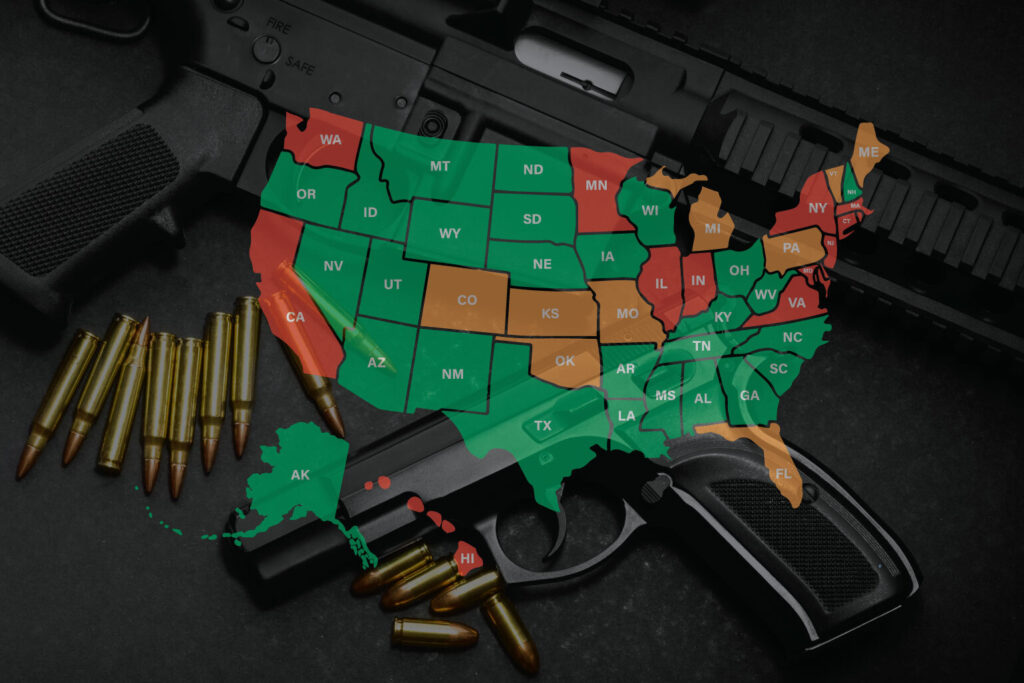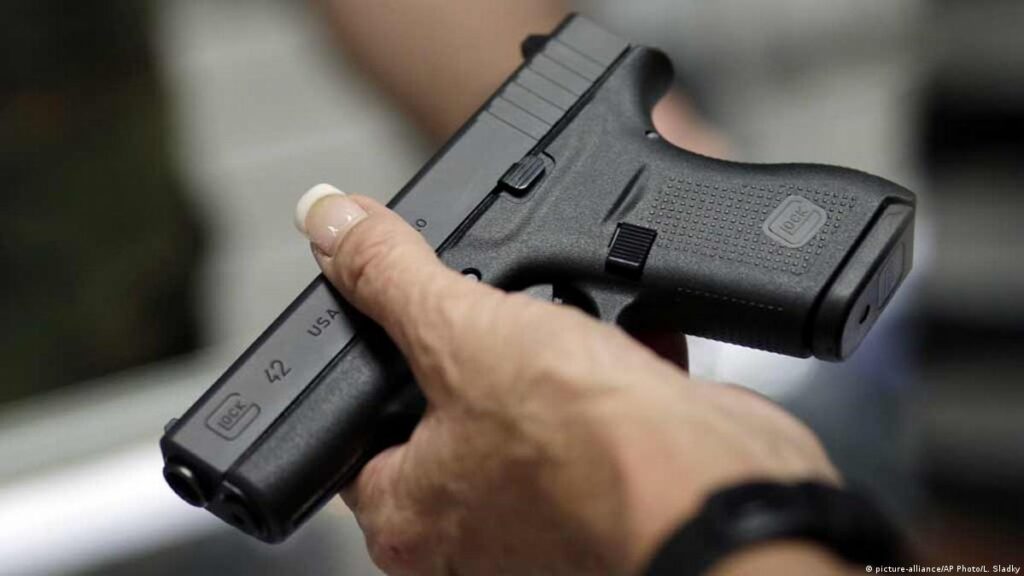
Understanding and interpreting local laws regarding firearms and ammunition is crucial for responsible gun ownership. In this article, you will explore the methods and resources available to gain a comprehensive understanding of the legal framework surrounding firearms in your local area. By delving into the various factors such as state laws, local ordinances, and federal regulations, you will empower yourself with the knowledge needed to navigate legal complexities and ensure compliance with the governing authorities. Whether you are a firearm enthusiast or a casual gun owner, grasping the intricacies of local laws is essential to navigating the landscape of firearms and ammunition effectively.

This image is property of i0.wp.com.
Understanding the Basics of Local Laws on Firearms and Ammunition
Local laws and regulations regarding firearms and ammunition are essential to ensure public safety and maintain order in communities. As a responsible citizen, it is crucial to have a thorough understanding of these laws to avoid any legal complications. This article will provide a comprehensive guide to help you interpret and navigate the basics of local laws on firearms and ammunition.
Type of Laws and Regulations
Local laws on firearms and ammunition can vary significantly depending on the jurisdiction and applicable authorities. These laws may include regulations on possession, ownership, transportation, transfer, and use of firearms. Understanding the different types of laws and regulations can help you navigate the legal landscape more effectively.
Jurisdiction and Applicable Authorities
Jurisdiction refers to the geographical area where a specific set of laws and regulations apply. Firearms and ammunition laws are generally enforced at the local, state, or federal level. The applicable authorities may include local law enforcement agencies, state police departments, or federal agencies such as the Bureau of Alcohol, Tobacco, Firearms and Explosives (ATF). It is essential to identify the relevant jurisdiction and the authorities responsible for enforcing the laws in your area.
Interpretation of Local Laws
Interpreting local laws regarding firearms and ammunition requires careful attention to legal language, definitions, and precedents. The interpretation may also depend on the specific jurisdiction and the unique circumstances of each situation. Consulting legal professionals or experts in firearm laws can provide valuable guidance in understanding and applying these laws correctly.
Identifying Relevant Local Laws
To ensure compliance with local laws, you must identify the specific regulations and statutes pertaining to firearms and ammunition in your jurisdiction. Researching the local ordinances, state statutes, and federal laws can help you gain a comprehensive understanding of the legal framework. Online resources, legal databases, or contacting local law enforcement agencies can be helpful in identifying the relevant laws and regulations.
Consulting Legal Professionals
Interpreting local laws on firearms and ammunition can be complex, and it is always advisable to seek legal counsel or advice from professionals specializing in firearm laws. Attorneys with expertise in this field can provide accurate interpretations, clarify any confusion, and guide you through the legal process. Their knowledge and experience can help ensure you stay compliant with local laws and protect your rights.
Firearm Definitions and Classifications
Understanding the definitions and classifications of firearms is fundamental to navigating local laws and regulations. Different jurisdictions may have varying definitions and classifications, but the following are some general aspects to consider.
Legal Definitions of Firearms
Each jurisdiction may have its own legal definition of firearms, which can include handguns, rifles, shotguns, or any other portable weapon capable of expelling a projectile and causing harm. Understanding how your jurisdiction defines firearms is crucial in determining which laws and regulations apply to them.
Classification of Firearms
Firearms can be classified based on various factors, such as their action type, barrel length, caliber, or overall size. Common classifications include pistols, revolvers, semi-automatic rifles, bolt-action rifles, shotguns, and more. Familiarizing yourself with these classifications can help you understand the specific regulations and restrictions that apply to each type.
Prohibited Firearms
Certain firearms may be deemed prohibited under local laws. These are typically weapons that are considered excessively dangerous, such as fully automatic machine guns, destructive devices, or firearms with a short barrel length. Understanding the prohibited firearms in your jurisdiction is essential to avoid legal consequences.
Restricted Firearms
In addition to prohibited firearms, some jurisdictions may have specific regulations and restrictions on certain weapons categorized as restricted firearms. These restrictions can include additional requirements for ownership, possession, or transportation, such as registering the firearm, obtaining special permits, or meeting specific qualifications. Being aware of the restricted firearms in your jurisdiction is crucial to ensure compliance with the law.
Possession and Ownership of Firearms
Possessing and owning firearms is a significant responsibility that comes with legal requirements and obligations. Understanding the specific laws and regulations regarding possession and ownership is crucial to ensure compliance and avoid legal repercussions.
Legal Requirements for Ownership
Ownership of firearms may require meeting certain legal requirements, such as being of a minimum age, having a clean criminal record, or passing background checks. Familiarize yourself with the ownership requirements specific to your jurisdiction to ensure you meet all necessary criteria.
Permits and Licenses
Depending on the jurisdiction, owning firearms may require obtaining permits or licenses. These permits or licenses demonstrate that the individual has met certain qualifications, such as completing a safety course, undergoing a background check, or demonstrating responsible firearm use. It is important to understand the specific permit or license requirements in your area and ensure compliance.
Age Restrictions
Age restrictions for owning firearms can vary from jurisdiction to jurisdiction. Some areas may have a minimum age requirement, while others may require individuals to be of legal adult age. Understanding the age restrictions in your area is crucial, especially if you are considering firearms ownership for self-defense or sporting purposes.
Procedure for Obtaining a Firearm
The procedure for obtaining a firearm can vary depending on the jurisdiction. It can involve completing paperwork, background checks, waiting periods, and potentially other requirements. Familiarize yourself with the specific procedures set forth by your jurisdiction to legally acquire a firearm.
Transporting Firearms and Ammunition
Transporting firearms and ammunition requires knowledge of the regulations to ensure safe and legal transportation. Violating transportation laws can have severe legal consequences, so it is important to understand the specific regulations in your jurisdiction.
Transport Regulations
Jurisdictions may have specific regulations governing the transport of firearms and ammunition. These regulations may include requirements such as storing firearms and ammunition separately, using locked containers, or transporting them unloaded. Familiarize yourself with the transportation regulations applicable to your jurisdiction to avoid running afoul of the law.
Secure Storage and Transport
Secure storage and transport of firearms and ammunition are essential to prevent accidents, theft, or unauthorized access. Jurisdictions may have specific requirements for secure storage, such as using locked containers, gun safes, or trigger locks. Understanding and adhering to these storage and transport requirements is crucial for both legal compliance and responsible firearm ownership.
License or Permit Requirements
Some jurisdictions may require individuals to obtain specific licenses or permits for transporting firearms and ammunition. These permits might include information about the purpose, duration, and destination of the transportation. Ensure that you understand the permit requirements for transporting firearms and ammunition in your jurisdiction.
Interstate and International Transport
Transporting firearms and ammunition across state lines or internationally requires compliance with additional laws and regulations. Each jurisdiction has its own rules regarding the transportation of firearms and ammunition across borders. Research the specific regulations and requirements of the jurisdictions involved in the transportation to ensure legal compliance.

This image is property of www.atf.gov.
Firearm Transfer and Sales
Transferring or selling firearms involves specific regulations to prevent illegal sales, ensure background checks, and maintain a record of firearm ownership. Understanding these laws is essential to ensure legal compliance and avoid potential legal complications.
Background Checks
Many jurisdictions require background checks for firearm transfers or sales. These checks aim to prevent firearms from falling into the wrong hands, such as individuals with criminal records or mental health issues. Understanding the background check requirements in your jurisdiction is crucial to ensure compliance when transferring or selling firearms.
Private Sales and Transfers
Some jurisdictions permit private sales or transfers of firearms between individuals without involving licensed firearm dealers. However, even in these cases, there may be additional requirements, such as ensuring the buyer meets certain qualifications or completing specific paperwork. Familiarize yourself with the private sales and transfer regulations in your jurisdiction to ensure legal compliance.
Firearm Dealer Regulations
Firearm dealers are subject to specific regulations and licensing requirements in most jurisdictions. These regulations aim to ensure responsible sales practices, maintain records of transfers, and prevent illegal activities. Understanding the regulations and requirements for firearm dealers in your jurisdiction is essential if you are involved in the sales or transfer of firearms.
Firearm Registration and Transfer Documentation
Jurisdictions may have requirements for registering firearms or documenting transfers. This typically involves completing specific paperwork, providing identification, and maintaining a record of the firearm’s ownership history. Familiarizing yourself with the registration and documentation requirements in your jurisdiction is critical to remain compliant with local laws.
Gun-Free Zones and Public Locations
Knowing where firearms are prohibited or restricted is crucial to avoid legal consequences and ensure public safety. Many jurisdictions designate specific areas as gun-free zones or restrict carrying firearms in certain public locations.
Understanding Restricted Areas
Restricted areas refer to locations where firearms are prohibited or have specific restrictions. These areas may include government buildings, schools, airports, or private properties with posted signs. Familiarize yourself with the restricted areas in your jurisdiction to avoid carrying firearms where they are not permitted.
Prohibited Locations
Certain locations are universally prohibited areas for firearms, such as courthouses, schools, or federal facilities. These areas have strict regulations due to security concerns, and carrying firearms within these premises is a criminal offense in most jurisdictions. Understanding the prohibited locations in your jurisdiction is crucial to ensure full compliance with the law.
Carrying in Public Spaces
Jurisdictions may have specific regulations regarding carrying firearms in public spaces. These regulations can include open carry, concealed carry, or complete restrictions on carrying firearms in public. Understanding the rules and regulations in your jurisdiction is vital to avoid inadvertently carrying firearms in public places where it is not allowed.
Exceptions and Exemptions
Some jurisdictions may have exceptions or exemptions to the restrictions on carrying firearms in certain locations. These exceptions can include law enforcement officers, security personnel, or individuals with specific permits or licenses. Familiarize yourself with the exceptions and exemptions in your jurisdiction to ensure compliance with the law.

This image is property of i0.wp.com.
Use of Firearms for Self-Defense
Understanding the laws regarding the use of firearms for self-defense is crucial for responsible firearm owners. While the specific laws may vary, the following topics provide a general overview of related legal aspects.
Stand Your Ground Laws
Stand Your Ground laws allow individuals to use deadly force in self-defense without the duty to retreat, even in public spaces. These laws vary from jurisdiction to jurisdiction and may include specific requirements and conditions for self-defense claims. Understanding the Stand Your Ground laws in your area is essential to know your rights and responsibilities as a firearm owner.
Castle Doctrine Laws
Castle Doctrine laws typically allow individuals to use force, including deadly force, to protect themselves or others within their own dwelling or property. Jurisdictions may have varying interpretations and conditions for Castle Doctrine laws, so understanding the specific laws in your area is crucial.
Use of Deadly Force
The use of deadly force, even in self-defense situations, is a serious matter with legal implications. It is essential to understand the laws and regulations surrounding the use of deadly force in your jurisdiction. These laws may include requirements for imminent threat, proportionality of force, and an individual’s duty to retreat before resorting to deadly force.
Duty to Retreat
Some jurisdictions impose a duty to retreat, which means individuals must exhaust all options to avoid violence before using firearms or deadly force. This duty to retreat can vary depending on the circumstances, such as being in your own dwelling, being threatened with severe bodily harm, or being in a public space. Familiarize yourself with the duty to retreat laws in your jurisdiction to understand your legal obligations in self-defense situations.
Firearm Modifications and Attachments
Firearm modifications and attachments can enhance performance, ergonomics, or personalization. However, it is important to understand the legal limitations and regulations surrounding these modifications.
Legal Modifications
Modifying firearms within legal limits is generally permissible, but jurisdictions may have specific regulations regarding the types of modifications allowed. Understanding these legal modifications can help you personalize your firearms while ensuring compliance with local laws.
Regulated Attachments
Some jurisdictions regulate specific firearm attachments or accessories, such as silencers, high-capacity magazines, or specific firearm grips. Understanding the regulations surrounding these attachments is crucial to avoid unnecessary legal complications.
Restrictions on Modifications
Certain modifications may be uniformly prohibited in many jurisdictions. These can include modifying firearms to fully automatic or illegally altering the barrel length of a firearm. Understanding the restrictions on modifications in your jurisdiction is essential to avoid violating local laws.
Concealable Firearms
Concealable firearms, such as those designed for concealed carry, may have specific regulations and restrictions. These regulations generally address factors such as barrel length, overall size, or caliber. Familiarize yourself with the regulations governing the concealment of firearms in your jurisdiction to ensure compliance and responsible firearms ownership.

This image is property of static.dw.com.
Safety and Storage Requirements
Firearm safety is of utmost importance to prevent accidents, misuse, or unauthorized access. Local laws often address safety and secure storage requirements to ensure responsible firearm ownership.
Safe Storage Laws
Safe storage laws generally require firearms to be securely stored, particularly when not in use. These laws may include requirements such as using lockable containers, gun safes, or trigger locks. Understanding and adhering to safe storage laws in your jurisdiction is crucial to prevent accidents and unauthorized access.
Child Access Prevention Laws
Child access prevention laws aim to prevent children from accessing firearms without appropriate supervision. These laws may include requirements for storing firearms locked, unloaded, or using additional safety measures, such as trigger locks. Familiarize yourself with the child access prevention laws in your jurisdiction to promote safe firearm ownership and protect children from potential harm.
Trigger Locks
Trigger locks are devices designed to prevent the accidental discharge of a firearm by immobilizing the trigger mechanism. Some jurisdictions may have specific requirements or recommendations regarding the use of trigger locks. Research the trigger lock regulations in your jurisdiction to enhance safety and prevent unauthorized use of firearms.
Firearm Safety Education
Firearm safety education can help individuals handle firearms responsibly and understand the potential risks and consequences associated with their use. Some jurisdictions may require or offer voluntary firearm safety education programs. Taking advantage of these programs can improve your knowledge and confidence in firearm handling while emphasizing safety and responsible ownership.
Firearms and Mental Health
The intersection of firearms and mental health requires careful consideration to ensure public safety and the well-being of individuals with mental health issues.
Restrictions for Individuals with Mental Health Issues
Many jurisdictions have restrictions on firearm ownership or possession for individuals with certain mental health conditions. These restrictions aim to prevent individuals who may pose a risk to themselves or others from accessing firearms. Understanding the restrictions related to mental health in your jurisdiction is crucial to ensure compliance and prioritize public safety.
Background Checks and Mental Health Records
Background checks often include a review of an individual’s mental health records to determine eligibility for firearm ownership. These checks may focus on factors such as a history of mental illness, involuntary commitment, or being deemed mentally unfit. Familiarize yourself with how mental health records are considered in background checks in your jurisdiction.
Red Flag Laws
Red Flag laws, also known as Extreme Risk Protection Orders, allow family members, law enforcement, or other concerned parties to petition the court to temporarily restrict an individual’s access to firearms if they pose a risk to themselves or others. These laws aim to prevent potential harm during times of crisis or when individuals may be exhibiting threatening behavior. Understanding the provisions of Red Flag laws in your jurisdiction is crucial to protect the well-being of individuals and the community.
Voluntary Surrender of Firearms
In certain situations, individuals with mental health concerns may voluntarily surrender their firearms to avoid potential harm or to address mental health issues. Jurisdictions may have specific procedures or resources available for individuals wishing to voluntarily surrender their firearms. Understanding the voluntary surrender options in your jurisdiction can help promote safety and well-being.
In conclusion, understanding the basics of local laws on firearms and ammunition is crucial for responsible firearm ownership. By familiarizing yourself with the various aspects of local laws, including definitions, classifications, ownership requirements, transport regulations, and self-defense laws, you can ensure legal compliance and prioritize public safety. Remember to consult legal professionals or experts in firearm laws for specific guidance and to stay informed about any updates or changes to these laws within your jurisdiction.

This image is property of cdn.cnn.com.







